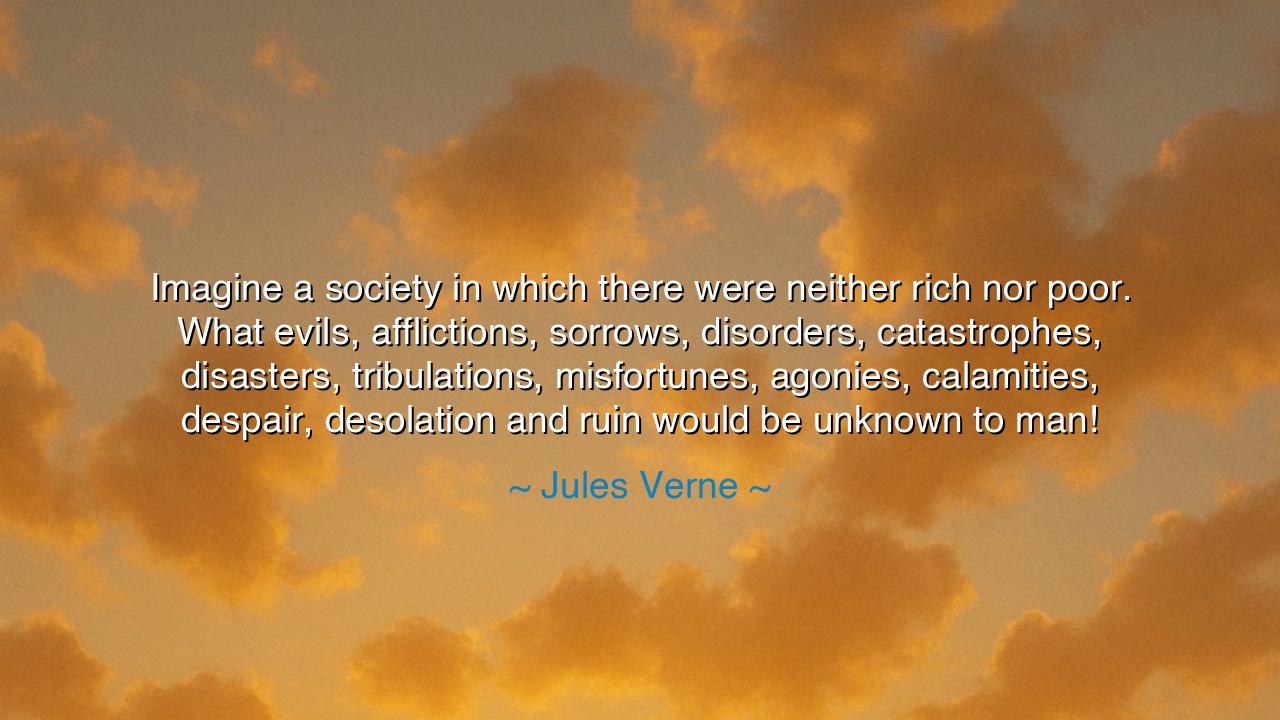
Imagine a society in which there were neither rich nor poor. What
Imagine a society in which there were neither rich nor poor. What evils, afflictions, sorrows, disorders, catastrophes, disasters, tribulations, misfortunes, agonies, calamities, despair, desolation and ruin would be unknown to man!






Hear the prophetic voice of Jules Verne, dreamer of worlds beyond the seas and skies, who declared: “Imagine a society in which there were neither rich nor poor. What evils, afflictions, sorrows, disorders, catastrophes, disasters, tribulations, misfortunes, agonies, calamities, despair, desolation and ruin would be unknown to man!” These words are both a lament and a vision. They lament the endless suffering birthed from inequality, and they envision a world where the balance of plenty erases the divisions of wealth. Verne, a man of boundless imagination, invites us to look not only at the stars, but at the inner structure of society, and to dare to believe that a world without extremes of rich and poor might be the cure for many of humanity’s deepest wounds.
The origin of these words arises from Verne’s reflections on the social injustices of the nineteenth century. He lived in an age when industry created immense fortunes for a few and endless hardship for the many. His writings often explored not only journeys of adventure, but the question of how human invention and human greed shaped the destinies of nations. In this vision, he saw clearly: it is not nature alone that afflicts man, but the inequalities he creates. The gap between rich and poor fuels envy, corruption, despair, and conflict; to imagine its erasure is to imagine the end of countless sorrows.
The ancients themselves grappled with this dream. Plato, in his Republic, spoke of a just city where guardians shared all in common, where property and wealth were not used to divide but to unite. His vision was mocked as impossible, yet it sprang from the same recognition as Verne’s: that disorder and calamity multiply wherever wealth is unevenly distributed. Even the Hebrew prophets cried the same warning, calling for jubilee years when debts would be forgiven and land returned, so that no man would be enslaved forever by poverty while others fattened on abundance.
History offers vivid testimony of Verne’s wisdom. Consider the French Revolution, born in an age where kings feasted while peasants starved. The people’s despair grew into fury, and that fury erupted into violence. Had wealth and opportunity been shared more equitably, the guillotine might never have been raised. The same lesson resounds in countless ages: where the gulf between rich and poor yawns wide, tribulation and ruin follow swiftly after. Inequality is not a stable foundation; it is a fault line that eventually shakes the earth.
Yet Verne does not only warn—he inspires. His call to “imagine a society without rich or poor” is not merely fantasy, but a challenge to reorient our minds. If imagination can carry us to the moon, can it not also carry us to a vision of fairness? To a land where the dignity of each person is upheld, where excess does not mock scarcity, where despair does not grow in the shadows of another’s fortune? To dream such a dream is the first step toward shaping laws, systems, and customs that close the abyss of inequality.
The meaning of his words, then, is heroic: that many of humanity’s deepest agonies are not decreed by heaven, but crafted by human hands—and so, they can be undone. Poverty and extreme wealth are not immutable laws of nature, but conditions shaped by greed, by power, by the choices of men. If we can imagine a better society, we can labor toward it. If we dare to see equality not as a dream but as a duty, then future generations may know fewer sorrows than we.
Therefore, children of the future, inscribe this wisdom upon your hearts: inequality breeds ruin, but fairness breeds peace. Do not accept the gap between rich and poor as inevitable. Work in your lives to share, to lift, to build systems that give opportunity to all. Support the weak, temper the power of the strong, and measure wealth not by gold but by the health of the whole community. For if Verne’s dream were realized, even in part, the sorrows of mankind would lessen, and the fabric of society would be woven strong, whole, and enduring.






AAdministratorAdministrator
Welcome, honored guests. Please leave a comment, we will respond soon